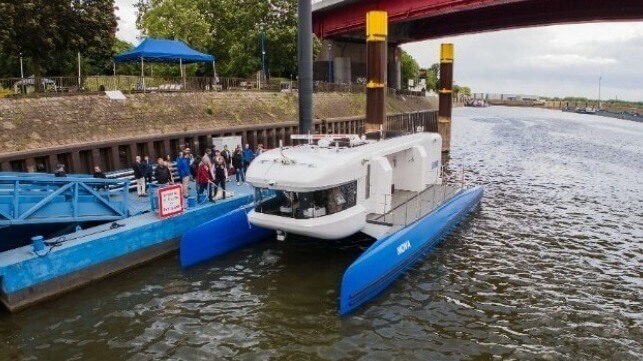Research Vessel “NOVA” Sets Course with Torqeedo Drive for New Paths

[By: Torqeedo]
Torqeedo, the world market leader for electric propulsion systems on the water, has provided an electric propulsion system for a new research vessel, “NOVA”, operated by the University of Duisburg-Essen (UDE) and the Development Center for Ship Technology and Transport Systems (DST). Since friday, the autonomous research vessel will operate on the Rhine, exploring ways to make inland shipping more environmentally friendly and efficient.
The vessel was officially christened “NOVA” at a ceremony held on May 23 at the Port of Duisburg. Among the guests of honor was Oliver Krischer, the North Rhine-Westphalian Minister for the Environment, Nature Conservation and Transport.
A milestone for the future of inland shipping in Germany.
“The christening of NOVA marks an important step towards more sustainable inland shipping. We are proud to support this forward-looking project with our comprehensive technology portfolio. Our systems are now so powerful and reliable that they can power even complex applications such as autonomous research vessels fully electrically or in hybrid mode. We are confident that the insights gained from operating the ‘NOVA’ will provide valuable momentum for the further development and widespread adoption of alternative propulsion systems in inland shipping” says Heiko Vietmeier, CEO of Torqeedo.
The 15-meter-long “NOVA” is an inland vessel with a twin-hull design. It will be capable of transporting both cargo and passengers. Its development and construction took approximately two years and it is powered by Torqeedo’s electric propulsion system. Four Deep Blue Batteries 80 supply energy to the two 50kW Deep Blue motors and all onboard systems. Torqeedo has provided a complete power management system with a dedicated low voltage power circuit for consumers like the autonomous navigation system, instruments and lighting, supplied by the high voltage system for propulsion. In addition two coupled Torqeedo System Management Units in combination with the OEM-Display Interface provide access to all relevant system data for various scientific analyses and monitoring of the power train. This way the scientists of UDE and DST can simply focus on their research into making the autonomous navigation software work.
Low-emission inland shipping is picking up speed
The planned research trips will take place in the Port of Duisburg on the Rhine and in canals throughout the Ruhr region. Researchers at the University of Duisburg-Essen anticipate that fully automated — and thus partially autonomous — inland vessels could be in regular operation within the next eight to ten years.
The products and services herein described in this press release are not endorsed by The Maritime Executive.
